|
Pope Benedict XVI - World Youth Day 2008 |
 "Christ
Offers More! Indeed He Offers Everything!"
"Christ
Offers More! Indeed He Offers Everything!"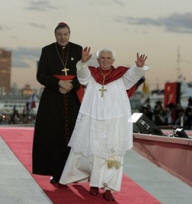
Opening Address and Welcome to Youth
His Holiness Benedict XVI
Barangaroo East Darling Harbor,
Sydney, Australia
July 17, 2007
Dear Young People,
What a delight it is to greet you here at Barangaroo, on the shores
of the magnificent Sydney harbour, with its famous bridge and Opera
House. Many of you are local, from the outback or the dynamic
multicultural communities of Australian cities. Others of you have
come from the scattered islands of Oceania, and others still from
Asia, the Middle East, Africa and the Americas. Some of you, indeed,
have come from as far as I have, Europe! Wherever we are from, we
are here at last in Sydney. And together we stand in our world as
God’s family, disciples of Christ, empowered by his Spirit to be
witnesses of his love and truth for everyone!
I wish firstly to thank the Aboriginal Elders who welcomed me prior
to my boarding the boat at Rose Bay. I am deeply moved to stand on
your land, knowing the suffering and injustices it has borne, but
aware too of the healing and hope that are now at work, rightly
bringing pride to all Australian citizens. To the young indigenous -
Aboriginal and Torres Strait Islanders - and the Tokelauans, I
express my thanks for your stirring welcome. Through you, I send
heartfelt greetings to your peoples.
Cardinal Pell, Cardinal Ryłko, Archbishop Wilson, I thank you for
your warm words of welcome. I know that your sentiments resonate in
the hearts of the young gathered here this evening, and so I thank
you all. Standing before me I see a vibrant image of the universal
Church. The variety of nations and cultures from which you hail
shows that indeed Christ’s Good News is for everyone; it has reached
the ends of the earth. Yet I know too that a good number of you are
still seeking a spiritual homeland. Some of you, most welcome among
us, are not Catholic or Christian. Others of you perhaps hover at
the edge of parish and Church life. To you I wish to offer
encouragement: step forward into Christ’s loving embrace; recognize
the Church as your home. No one need remain on the outside, for from
the day of Pentecost the Church has been one and universal.
This evening I wish also to include those who are not present among
us. I am thinking especially of the sick or
mentally ill, young people in prison, those struggling on the
margins of our societies, and those who for whatever reason feel
alienated from the Church. To them I say: Jesus is close to you!
Feel his healing embrace, his compassion and mercy!
Almost two thousand years ago, the Apostles, gathered in the upper
room together with Mary and some faithful women, were filled with
the Holy Spirit (cf. Acts 1:14; 2:4). At that extraordinary moment,
which gave birth to the Church, the confusion and fear that had
gripped Christ’s disciples were transformed into a vigorous
conviction and sense of purpose.
They felt impelled to speak of their encounter with the risen Jesus
whom they had come to call affectionately, the Lord. In many ways,
the Apostles were ordinary. None could claim to be the perfect
disciple. They failed to recognize Christ (cf. Lk 24:13-32), felt
ashamed of their own ambition (cf. Lk 22:24-27), and had even denied
him (cf. Lk 22:54-62). Yet, when empowered by the Holy Spirit, they
were transfixed by the truth of Christ’s Gospel and inspired to
proclaim it fearlessly.
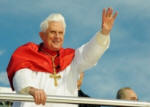
Emboldened, they exclaimed: repent, be baptized, receive the Holy
Spirit (cf. Acts 2:37-38)! Grounded in the Apostles’ teaching, in
fellowship, and in the breaking of the bread and prayer (cf. Acts
2:42), the young Christian community moved forward to oppose the
perversity in the culture around them (cf. Acts 2:40), to care for
one another (cf. Acts 2:44-47), to defend their belief in Jesus in
the face of hostility (cf Acts 4:33), and to heal the sick (cf. Acts
5:12-16). And in obedience to Christ’s own command, they set forth,
bearing witness to the greatest story ever: that God has become one
of us, that the divine has entered human history in order to
transform it, and that we are called to immerse ourselves in
Christ’s saving love which triumphs over evil and death. Saint Paul,
in his famous speech to the Areopagus, introduced the message in
this way: “God gives everything – including life and breath – to
everyone … so that all nations might seek God and, by feeling
their way towards him, succeed in finding him. In fact he is not far
from any of us, since it is in him that we live and move and have
our being” (Acts 17: 25-28).
And ever since, men and women have set out to tell the same story,
witnessing to Christ’s truth and love, and
contributing to the Church’s mission. Today, we think of those
pioneering Priests, Sisters and Brothers who came to these shores,
and to other parts of the Pacific, from Ireland, France, Britain and
elsewhere in Europe. The great majority were young - some still in
their late teens - and when they bade farewell to their parents,
brothers and sisters, and friends, they knew they were unlikely ever
to return home. Their whole lives were a selfless Christian witness.
They became the humble but tenacious builders of so much of the
social and spiritual heritage which still today brings goodness,
compassion and purpose to these nations. And they went on to inspire
another generation. We think immediately of the faith which
sustained Blessed Mary MacKillop in her sheer determination to
educate especially the poor, and Blessed Peter To Rot in his
steadfast resolution that community leadership must always include
the Gospel. Think also of your own grandparents and parents, your
first teachers in faith. They too have made countless sacrifices of
time and energy, out of love for you.
Supported by your parish priests and teachers, they have the task,
not always easy but greatly satisfying, of guiding you towards all
that is good and true, through their own witness - their teaching
and living of our Christian faith.
Today, it is my turn. For some of us, it might seem like we have
come to the end of the world! For people of your age, however, any
flight is an exciting prospect. But for me, this one was somewhat
daunting! Yet the views afforded of our planet from the air were
truly wondrous. The sparkle of the Mediterranean, the grandeur of
the north African desert, the lushness of Asia’s forestation, the
vastness of the Pacific Ocean, the horizon upon which the sun rose
and set, and the majestic splendour of Australia’s natural beauty
which I have been able to enjoy these last couple of days; these all
evoke a profound sense of awe. It is as though one catches glimpses
of the Genesis creation story - light and darkness, the sun and the
moon, the waters, the earth, and living creatures; all of which are
“good” in God’s eyes (cf. Gen 1:1 - 2:4). Immersed in such beauty,
who could not echo the words of the Psalmist in praise of the
Creator: “how majestic is your name in all the earth?” (Ps 8:1).
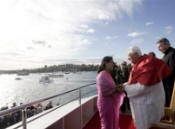
And there is more – something hardly perceivable from the sky – men
and women, made in nothing less than God’s own image and likeness
(cf. Gen 1:26). At the heart of the marvel of creation are you and
I, the human family “crowned with glory and honour” (Ps 8:5). How
astounding! With the Psalmist we whisper: “what is man that you are
mindful of him?” (Ps 8:4). And drawn into silence, into a spirit of
thanksgiving, into the power of holiness, we ponder. What do we
discover? Perhaps reluctantly we come to acknowledge that there are
also scars which mark the surface of our earth: erosion,
deforestation, the squandering of the world’s mineral and ocean
resources in order to fuel an insatiable consumption. Some of you
come from island nations whose very existence is threatened by
rising water levels; others from nations suffering the effects of
devastating drought. God’s wondrous creation is sometimes
experienced as almost hostile to its stewards, even something
dangerous. How can what is “good” appear so threatening?
And there is more. What of man, the apex of God’s creation? Every
day we encounter the genius of human achievement. From advances in
medical sciences and the wise application of technology, to the
creativity reflected in the arts, the quality and enjoyment of
people’s lives in many ways are steadily rising. Among yourselves
there is a readiness to take up the plentiful opportunities offered
to you. Some of you excel in studies, sport, music, or dance and
drama, others of you have a keen sense of social justice and ethics,
and many of you take up service and voluntary work. All of us, young
and old, have those moments when the innate goodness of the human
person - perhaps glimpsed in the gesture of a little child or an
adult’s readiness to forgive - fills us with profound joy and
gratitude.
Yet such moments do not last. So again, we ponder. And we discover
that not only the natural but also the social environment – the
habitat we fashion for ourselves – has its scars; wounds indicating
that something is amiss. Here too, in our personal lives and in our
communities, we can encounter a hostility, something dangerous; a
poison which threatens to corrode what is good, reshape who we are,
and distort the purpose for which we have been created. Examples
abound, as you yourselves know. Among the more prevalent are alcohol
and drug abuse, and the exaltation of violence and sexual
degradation, often presented through television and the internet as
entertainment. I ask myself, could anyone standing face to face with
people who actually do suffer violence and sexual exploitation
“explain” that these tragedies, portrayed in virtual form, are
considered merely “entertainment”?
There is also something sinister which stems from the fact that
freedom and tolerance are so often separated from truth. This is
fuelled by the notion, widely held today, that there are no absolute
truths to guide our lives. Relativism, by indiscriminately giving
value to practically everything, has made “experience”
all-important. Yet, experiences, detached from any consideration of
what is good or true, can lead, not to genuine freedom, but to moral
or intellectual confusion, to a lowering of standards, to a loss of
self-respect, and even to despair.
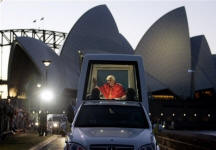
Dear friends, life is not governed by chance; it is not random. Your
very existence has been willed by God, blessed and given a purpose
(cf. Gen 1:28)! Life is not just a succession of events or
experiences, helpful though many of them are.
It is a search for the true, the good and the beautiful. It is to
this end that we make our choices; it is for this that we exercise
our freedom; it is in this – in truth, in goodness, and in beauty –
that we find happiness and joy. Do not be fooled by those who see
you as just another consumer in a market of undifferentiated
possibilities, where choice itself becomes the good, novelty usurps
beauty, and subjective experience displaces truth.
Christ offers more! Indeed he offers everything! Only he who is the
Truth can be the Way and hence also the Life. Thus the “way” which
the Apostles brought to the ends of the earth is life in Christ.
This is the life of the Church. And the entrance to this life, to
the Christian way, is Baptism.
This evening I wish therefore to recall briefly something of our
understanding of Baptism before tomorrow
considering the Holy Spirit. On the day of your Baptism, God drew
you into his holiness (cf. 2 Pet 1:4). You were adopted as a son or
daughter of the Father. You were incorporated into Christ. You were
made a dwelling place of his Spirit (cf. 1 Cor 6:19). Baptism is
neither an achievement, nor a reward. It is a grace; it is God’s
work. Indeed, towards the conclusion of your Baptism, the priest
turned to your parents and those gathered and, calling you by your
name said: “you have become a new creation” (Rite of Baptism, 99).
Dear friends, in your homes, schools and universities, in your
places of work and recreation, remember that you
are a new creation! Not only do you stand before the Creator in awe,
rejoicing at his works, you also realize that the sure foundation of
humanity’s solidarity lies in the common origin of every person, the
high-point of God’s creative design for the world. As Christians you
stand in this world knowing that God has a human face - Jesus Christ
- the “way” who satisfies all human yearning, and the “life” to
which we are called to bear witness, walking always in his light
(cf. ibid., 100).
The task of witness is not easy. There are many today who claim that
God should be left on the sidelines, and that religion and faith,
while fine for individuals, should either be excluded from the
public forum altogether or included only in the pursuit of limited
pragmatic goals. This secularist vision seeks to explain human life
and shape society with little or no reference to the Creator. It
presents itself as neutral, impartial and inclusive of everyone. But
in reality, like every ideology, secularism imposes a world-view. If
God is irrelevant to public life, then society will be shaped in a
godless image, and debate and policy concerning the public good will
be driven more by consequences than by principles grounded in truth.
Yet experience shows that turning our back on the Creator’s plan
provokes a disorder which has inevitable
repercussions on the rest of the created order (cf. 1990 World Day
of Peace Message, 5). When God is eclipsed, our ability to recognize
the natural order, purpose, and the “good” begins to wane. What was
ostensibly promoted as human ingenuity soon manifests itself as
folly, greed and selfish exploitation. And so we have become more
and more aware of our need for humility before the delicate
complexity of God’s world.
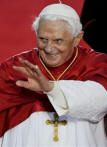
But what of our social environment? Are we equally alert to the
signs of turning our back on the moral structure
with which God has endowed humanity (cf. 2007 World Day of Peace
Message, 8)? Do we recognize that the innate dignity of every
individual rests on his or her deepest identity - as image of the
Creator - and therefore that human rights are universal, based on
the natural law, and not something dependent upon negotiation or
patronage, let alone compromise?
And so we are led to reflect on what place the poor and the elderly,
immigrants and the voiceless, have in our societies. How can it be
that domestic violence torments so many mothers and children? How
can it be that the most wondrous and sacred human space – the womb –
has become a place of unutterable violence?
My dear friends, God’s creation is one and it is good. The concerns
for non-violence, sustainable development,
justice and peace, and care for our environment are of vital
importance for humanity. They cannot, however, be understood apart
from a profound reflection upon the innate dignity of every human
life from conception to natural death: a dignity conferred by God
himself and thus inviolable. Our world has grown weary of greed,
exploitation and division, of the tedium of false idols and
piecemeal responses, and the pain of false promises. Our hearts and
minds are yearning for a vision of life where love endures, where
gifts are shared, where unity is built, where freedom finds meaning
in truth, and where identity is found in respectful communion. This
is the work of the Holy Spirit! This is the hope held out by the
Gospel of Jesus Christ. It is to bear witness to this reality that
you were created anew at Baptism and strengthened through the gifts
of the Spirit at Confirmation. Let this be the message that you
bring from Sydney to the world!
Look at the One they
Pierced!
This page is the work of the Servants of the Pierced Hearts of Jesus and
Mary